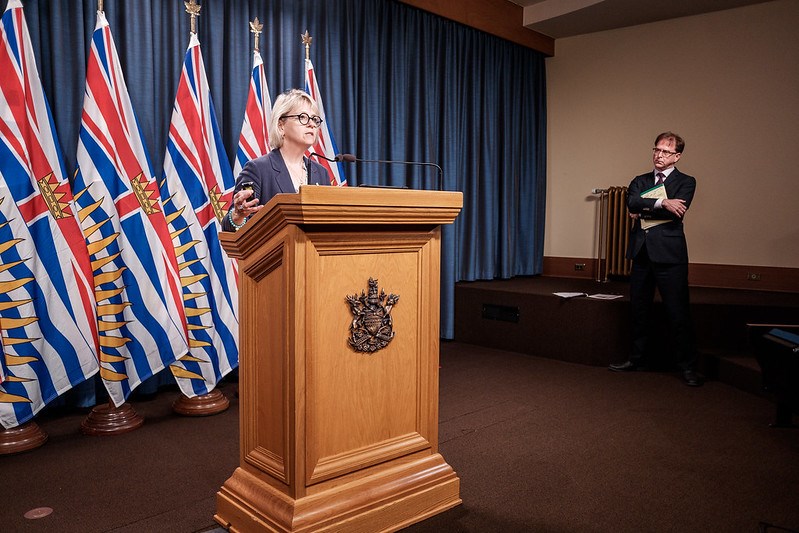Vancouver Island has seen six new COVID-19 cases since Friday as part of a provincewide uptick that provincial health officer Dr. Bonnie Henry called a warning to British Columbians.
There were 102 new cases in the past three days across the province.
“We are at a place where we could see a rapid progression of transmission of this virus if we’re not careful,” said Henry at briefing Monday. “We do have a possibility of having explosive growth in our outbreak here in B.C. if we’re not careful in how we progress for the summer.”
On July 1, the province moved its Restart Plan to Phase Three, allowing businesses to expand their services and individuals to expand their social interactions.
The disease reproductive rate is now higher than one, where one sick person infects more than one other person.
New cases are appearing in clusters, said Henry, citing parties and expanded gatherings, including people going together to restaurants, bars and clubs, house boats, resorts and private homes.
“We’re no longer having safe connections, that is what’s spreading this virus,” said Henry. “If we increase our social interactions too much, without doing it safely, we do risk a rebound that will impact us all.”
Henry explained some people are meeting in small groups but frequently different ones, making it increasingly harder for public health officials to trace contacts in a timely way.
In B.C., there were 51 new cases from Friday to Saturday, 19 from Saturday to Sunday, and 32 from Sunday to Monday.
British Columbians and public health teams have been effective in containing the spread of COVID-19, but everyone needs to continue to do their part, said Henry. “This is a warning to us.”
Henry said under the provincial restart plan, British Columbians are at 65 to 75 per cent of the contact they had before the pandemic.
There are currently 253 active COVID-19 cases in the province.
To date, there have been 142 cases in Island Health, up from 136 last week. The majority of those — 127 — have recovered, while five have died.
No new deaths were reported since Friday. A total of 189 people have died of COVID-19 in B.C.
There is one outbreak in long-term care and two outbreaks in acute-care hospitals; none of them are on Vancouver Island.
To date, 3,300 people have tested positive for COVID-19 in B.C., of whom 2,858 have recovered.
The median age of British Columbians who are testing positive is 50, a number expected to drop further as more people in their 20s and 30s test positive.
The median age of people who have died from the disease is 85.
Henry said the fatality rate of those infected with COVID-19 either through travel or through individual connections, for example — not part of an outbreak — is at 2.6 per cent, which is “much higher” than with influenza. As well, 25 per cent of seniors in long-term care homes who test positive have died.
B.C. Health Minister Adrian Dix called the rise in cases a “sobering reminder” of the need to stick to physical distancing, hand hygiene and other rules that keep the virus at bay. “We know that with COVID-19, each moment of each day matters.”
Henry urged young people to get the message out on social media about the need to physically distance. “We need to bend that curve back down.”
Henry talked about results from a survey of British Columbians called Your Story, Our Future completed by more than 394,000 people.
The survey, through the B.C. Centre for Disease Control website, was launched to learn more about how residents are faring during the COVID-19 pandemic.
Four in five of people in B.C. approved of the pandemic response of public health officials in the province, though fewer young people thought so.
A significant proportion of people in B.C. felt that their mental health was worsening because of the pandemic, whether that was anxiety, concern about the virus, fear about losing their job, fear about not being able to care for their families, said Henry. About one third of people who answered the survey reported having difficulty accessing health care.
Young people bore a greater proportion of the mental health and economic burden than older adults, said Henry, possibly because the pandemic has impacted many of the occupations that they work in such as the retail, accommodations and food services industries.
As well, families with children reported greater mental health and economic burden than adults without children, said Henry.
“Worsening mental health, stress, sleep reduction, increased alcohol consumption and concerns about financial situations in particular are the areas that have been dramatically impacted by closures during the response to the pandemic,” said Henry.



